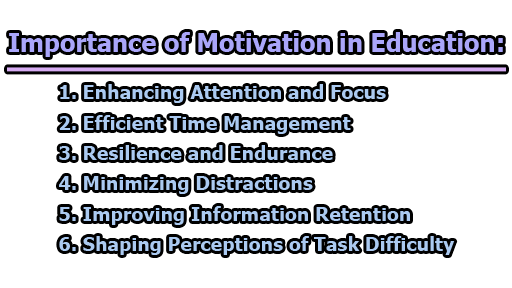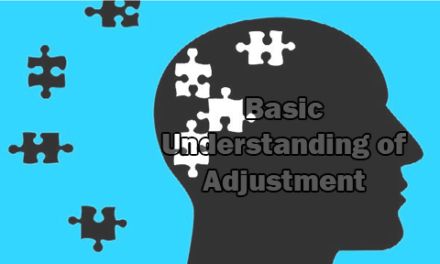Importance of Motivation in Education:
Motivation in education is a dynamic force that propels students toward academic success, influencing their attention, behavior, and overall learning experience. It goes beyond mere interest; motivation is the engine that drives students to tackle challenges, persevere through difficulties, and actively engage with the educational process. In this article, we delve into the multifaceted importance of motivation in education, exploring how it impacts various aspects of students’ academic journeys.
1. Enhancing Attention and Focus: Motivation serves as a potent force in enhancing students’ attention and focus within the educational context. When students are motivated, they are more inclined to direct their cognitive resources toward the tasks at hand. This focused attention is crucial for effective learning, as it allows students to immerse themselves in the subject matter, comprehend complex concepts, and actively participate in classroom activities.
Motivated learners exhibit a higher level of engagement during lectures, discussions, and study sessions. They are more likely to ask questions, seek clarification, and contribute meaningfully to class activities. This heightened level of involvement not only benefits individual students but also enriches the overall learning environment, fostering a sense of collaboration and shared enthusiasm.
Furthermore, motivation acts as a buffer against the pervasive challenge of distractions. In an era dominated by digital stimuli and constant connectivity, students face numerous external diversions that can impede their concentration. Motivated students demonstrate an enhanced ability to resist these distractions, ensuring that their attention remains steadfast on the educational objectives at hand. This focused attention, driven by motivation, lays the foundation for a more immersive and productive learning experience.
2. Efficient Time Management: Motivation plays a pivotal role in shaping students’ approach to time management within the academic sphere. When students are motivated, they exhibit a heightened sense of purpose and urgency in completing tasks. This intrinsic drive to achieve academic goals encourages a strategic allocation of time, ensuring that students prioritize and execute their responsibilities effectively.
Motivated individuals tend to complete tasks in shorter periods without compromising the quality of their work. This efficiency in time management is particularly beneficial in a scholastic environment where students are often faced with a multitude of assignments, projects, and examinations. By instilling a sense of purpose, motivation empowers students to navigate through their academic responsibilities with a clear focus, optimizing their use of time and energy.
Moreover, efficient time management driven by motivation contributes to a more balanced academic life. Students can allocate dedicated time to various subjects, extracurricular activities, and personal pursuits without feeling overwhelmed. This balance is essential for holistic development and prevents burnout, allowing students to thrive academically while maintaining a well-rounded lifestyle.
3. Resilience and Endurance: Motivation emerges as a key factor in building students’ resilience and endurance, characteristics vital for overcoming challenges in the educational journey. Inevitably, students encounter obstacles, be it in the form of challenging coursework, demanding examinations, or setbacks in their academic pursuits. Motivation serves as a reservoir of inner strength, propelling students to persevere through difficulties and setbacks.
Motivated individuals are more likely to view challenges as opportunities for growth rather than insurmountable hurdles. This positive mindset instilled by motivation enables students to approach obstacles with a sense of determination, resilience, and a belief in their ability to overcome adversity. The capacity to bounce back from setbacks is a critical skill that extends beyond the classroom, preparing students for the dynamic challenges they may face in their future endeavors.
Furthermore, motivation contributes to sustained endurance during rigorous academic periods. Whether preparing for comprehensive examinations or engaging in extensive research projects, motivated students exhibit a steadfast commitment to their academic pursuits. This resilience ensures that students not only navigate through demanding academic requirements but also emerge from these challenges with a sense of accomplishment and personal growth.
4. Minimizing Distractions: Motivation acts as a powerful tool in minimizing distractions, creating an environment conducive to focused and effective learning. In today’s digital age, students contend with a myriad of potential disruptions, ranging from social media notifications to the lure of entertainment. Motivation provides a mental shield, enabling students to resist these distractions and maintain a singular focus on their academic tasks.
Motivated learners develop a heightened awareness of the importance of concentration, recognizing that sustained attention is instrumental in achieving their educational goals. This heightened focus not only enhances the quality of their study sessions but also cultivates a habit of deep learning. By resisting external temptations, motivated students create a learning environment that encourages the retention of information and the development of critical thinking skills.
Additionally, the ability to minimize distractions has broader implications for cognitive development. As students learn to navigate a world filled with stimuli, the discipline instilled by motivation equips them with valuable skills for the future. In professional settings and personal pursuits, individuals who can minimize distractions are better positioned to tackle complex problems and make informed decisions.
5. Improving Information Retention: Motivation significantly influences students’ capacity for information retention and storage. Motivated learners not only absorb information more effectively but also demonstrate a higher level of recall when needed. This link between motivation and memory is a crucial aspect of the learning process, impacting students’ ability to apply acquired knowledge and skills in diverse academic contexts.
The intrinsic drive that motivation provides creates an optimal state for the encoding and consolidation of information in the brain. When students are motivated, they are more likely to approach learning with curiosity and a genuine interest in the subject matter. This positive attitude enhances the brain’s receptiveness to new information, facilitating the creation of lasting neural connections that contribute to long-term memory.
Moreover, the improved information retention associated with motivation fosters a sense of confidence in students. As they accumulate knowledge and skills, motivated learners feel more empowered to tackle increasingly complex academic challenges. This positive cycle of motivation, learning, and retention establishes a solid foundation for academic success and sets the stage for a lifelong commitment to continuous learning.
6. Shaping Perceptions of Task Difficulty: Motivation plays a pivotal role in shaping students’ perceptions of the difficulty of academic tasks. When students are motivated, they approach challenges with a positive mindset, viewing them as opportunities for growth rather than insurmountable obstacles. This shift in perspective is transformative, influencing the way students navigate through their educational journey.
Motivated students are more likely to embrace challenging tasks with a sense of curiosity and enthusiasm. Rather than being intimidated by difficulty, they see it as a chance to stretch their capabilities and expand their knowledge base. This optimistic outlook fosters a resilient mindset, encouraging students to persist in the face of challenges and setbacks.
Furthermore, the positive perception of task difficulty contributes to the development of a growth mindset – the belief that abilities can be developed through dedication and hard work. Motivated learners cultivate a mindset that positions them to embrace challenges, learn from failures, and continuously improve. This adaptive mindset becomes a cornerstone for lifelong learning, enabling individuals to navigate the complexities of an ever-evolving world with confidence and resilience.
In conclusion, the importance of motivation in education cannot be overstated. It serves as the cornerstone of academic success, impacting students’ attention, time management, resilience, focus, and overall cognitive processes. As educators and stakeholders in the realm of learning, fostering and sustaining motivation should be a priority. By recognizing and harnessing the power of motivation, we create an environment that not only promotes academic achievement but also instills a lifelong love for learning, ensuring that education becomes a fulfilling and enriching journey for every student.

Library Lecturer at Nurul Amin Degree College










